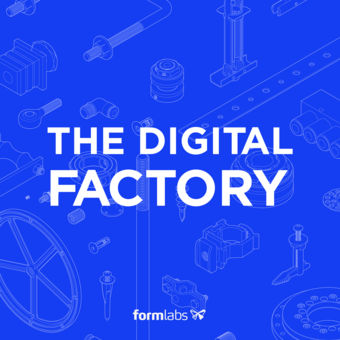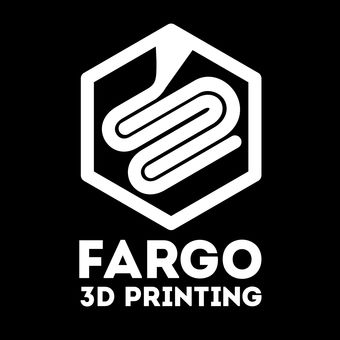
The Digital Factory
Formlabs
The future of manufacturing is digital. We explore the technologies that are transforming fabrication, from advanced 3D printing to AI-assisted design, and get to know the leaders who are bringing them to the factory floor. The Digital Factory is hosted by Jon Bruner and presented by Formlabs.
- 22 minutes 21 secondsFireside Chat: FedEx's CIO on the future of the digital supply chain
Rob Carter has served as FedEx's Chief Information Officer for nearly 20 years, developing the company's information infrastructure and implementing new cutting-edge technologies. In this fireside chat with Jeff Immelt recorded at the Digital Factory Conference in 2019, Carter discusses the role of technology at FedEx, how FedEx learns about and evaluates new technologies, and how it puts innovation at the center of its business.
Visit https://www.thedigitalfactory.com/videos/the-digital-supply-chain to watch the video version of this fireside chat, and to watch other videos from the Digital Factory Conference.
 26 September 2019, 2:41 am
26 September 2019, 2:41 am - 37 minutes 17 secondsEpisode 25: Sustainability as a business model
Corporate sustainability has its roots in risk management and health and safety management—sort of a conservative, back-office function. Now it’s a competitive differentiator.
In this episode of the Digital Factory Podcast, Jon Bruner talks with Zoé Bezpalko, sustainability strategy manager at Autodesk, about how manufacturers can use new technologies to make products sustainably—and to reach customers, potential employees, and partners who demand sustainability.
Visit http://bit.ly/2mPeK9W for links and notes on this episode.
 26 September 2019, 2:40 am
26 September 2019, 2:40 am - 49 minutes 36 secondsEpisode 24: The environmental impact of 3D printing is not what you'd expect
How sustainable is 3D printing? Ask most experts and you’ll get some hand-waving: it creates less waste than machining and reduces transportation energy, but many materials aren’t recyclable. All of those factors turn out to be overstated when they’re subjected to careful study.
In this episode of the Digital Factory Podcast, Jon Bruner talks with Jeremy Faludi, an assistant professor of sustainable design at TU Delft, about the measurable environmental impact of 3D printing. His conclusions are nuanced and sometimes surprising.
Visit http://bit.ly/2ZnzbNF for links and notes on this episode.
 29 August 2019, 2:40 am
29 August 2019, 2:40 am - 34 minutes 9 secondsEpisode 23: Terry Wohlers on 3D printing at scale
Terry Wohlers, President of Wohlers Associates and author of the authoritative Wohlers Report on 3D printing, is my guest on this episode of the podcast. We talk about 3D printing at scale, the importance of design for additive, the emergence of metal 3D printing, and the inflection points he’s watching for.
Videos of every presentation at the Digital Factory Conference are now available at https://www.thedigitalfactory.com/videos, and Wohlers is featured on this panel: https://www.thedigitalfactory.com/videos/scaling-additive-manufacturing-from-prototype-to-production
Visit http://bit.ly/2ylwgW2 for full episode notes and links.
 30 July 2019, 8:52 pm
30 July 2019, 8:52 pm - 26 minutes 24 secondsEpisode 22: Networked, Decentralized, AI-driven manufacturing with Bram de Zwart
3D Hubs reoriented its business last fall, away from hobbyists and toward the professional market. Now it’s planning to invest heavily in AI-driven automation.
In this episode Jon Bruner speaks with Bram de Zwart, co-founder and CEO of 3D Hubs. Brian Garret, 3D Hubs' other co-founder and Chief Product Officer, is speaking at the Digital Factory Conference on May 7, alongside other CEOs, CTOs, and CIOs who are transforming their businesses through manufacturing. Visit https://www.thedigitalfactory.com to see the program and register.
Visit http://bit.ly/2vzLlSB for full episode notes and links.
 28 April 2019, 11:10 pm
28 April 2019, 11:10 pm - 26 minutes 42 secondsEpisode 21: Inside the world's largest 3D printing operation
The 3D printers at Align Technology turn out half a million parts every day—an exceptional scale that makes the company the largest user of 3D printing in the world.
But, as lots of companies have learned, installing a 3D printing capability is only the first step toward digital production. Align’s massive, custom-built additive production line is part of a digital workflow that begins when a patient’s mouth is scanned and incorporates generative design, deep learning, and lots of automation.
In this episode Jon Bruner speaks with Emory Wright, Senior Vice President for Global Operations at Align. Joe Hogan, Align's CEO, is speaking at the Digital Factory Conference on May 7, alongside other CEOs, CTOs, and CIOs who are transforming their businesses through manufacturing. Visit https://www.thedigitalfactory.com to see the program and register.
Visit http://bit.ly/2UoaMjV for full episode notes and links.
 17 April 2019, 7:06 am
17 April 2019, 7:06 am - 45 minutes 17 secondsEpisode 20: Standard reference peanut butter with Steven Choquette
The National Institute of Standards and Technology, or NIST, offers a striking catalog of reference materials that includes peanut butter, New Jersey soil, domestic sludge, Lake Michigan fish tissue, and Spam. These materials turn out to illuminate the fascinating process by which measurement standards are defined in terms of fundamental physical constants and then handed down by NIST as artifacts that anyone can use to calibrate a bathroom scale or detect impurities in molybdenum oxide.
In this episode Jon Bruner interviews Steven Choquette, director of NIST's Office of Reference Materials, about the 1,300 materials that NIST's scientists produce and certify, and about the future of the program in biological materials.
Visit http://bit.ly/nistsrm for full episode notes and links. And visit https://www.thedigitalfactory.com to learn more about The Digital Factory Conference, returning to Boston on May 7, 2019. Register to join CEOs, CTOs, and CIOs who are transforming their businesses through manufacturing.
 1 March 2019, 9:20 am
1 March 2019, 9:20 am - 24 minutes 47 secondsEpisode 19: Dayna Grayson: can startups compete in manufacturing?
It’s difficult to sell new technologies to big manufacturers. If you’ve got a novel way to build things and a fresh startup to market it, you’ll run into all sorts of obstacles: established industrial companies tend to be risk-averse, top-down organizations with long replacement cycles and highly specific requirements. Many industrial startups generate lots of interest but starve as they trek through long sales cycles.
Dayna Grayson sees that changing. She’s a partner at NEA who has invested in several next-generation manufacturing startups, including Formlabs, Desktop Metal, Onshape, and Upskill, and she points to three major shifts that have made manufacturing a compelling sector for startups to address.
Visit http://bit.ly/2Xco9WR for full episode notes and links. And visit https://www.thedigitalfactory.com/ to learn more about The Digital Factory Conference, returning to Boston on May 7, 2019. Dayna Grayson will speak along with CEOs, CTOs, and CIOs who are transforming their businesses through manufacturing.
 21 February 2019, 1:20 am
21 February 2019, 1:20 am - 21 minutes 1 secondEpisode 18: Jeff Immelt on the Four A’s of Advanced Manufacturing
The Digital Factory Conference, our advanced-manufacturing leadership summit, is coming back to Boston on May 7. This year it’s got a new co-host: Jeff Immelt, who spent 16 years as CEO of GE and is now, among other roles, a partner at NEA. Visit https://thedigitalfactory.com/ to learn more about the conference.
This episode of the Digital Factory Podcast features a wide-ranging conversation between Jeff and Jon Bruner about digital transformation in manufacturing. In his investing, Jeff focuses on what he calls the “Four A’s:” artificial intelligence, automation, analytics, and additive manufacturing. Not only will those technologies improve overall manufacturing productivity, they also promise to introduce new capabilities that can drive transformative business models, like mass customization, machine-as-a-service, and rapid product development.
For full episode notes, visit http://bit.ly/2HHHwTZ.
 1 February 2019, 2:00 am
1 February 2019, 2:00 am - 34 minutes 32 secondsEpisode 17: 2018 in review
Jon Bruner and Andrew Edman talk about the value of proprietary manufacturing technology, the aesthetics of generative design, the influence of social media on product design, and the acceleration of the product lifecycle. For links related to this episode, visit http://bit.ly/2CqLqw7.
 21 December 2018, 5:05 pm
21 December 2018, 5:05 pm - 37 minutes 14 secondsEpisode 16: Live from Formnext with Joris Peels, Nora Toure, and John Hart
Last week a large part of the 3D printing industry gathered in Frankfurt to visit Formnext, an immense additive manufacturing trade show. In this episode, recorded in the hallway outside the Formnext show floor, we bring you interviews with three authorities on 3D printing: Joris Peels, editor-in-chief of 3DPrint.com; Nora Toure, founder of Women in 3D Printing, and A. John Hart, associate professor of mechanical engineering at MIT and co-founder of Desktop Metal.
Visit http://bit.ly/2A4XIri to see links and background for this episode.
 21 November 2018, 5:46 pm
21 November 2018, 5:46 pm - More Episodes? Get the App
- https://thedigitalfactory.com/
- English
Your feedback is valuable to us. Should you encounter any bugs, glitches, lack of functionality or other problems, please email us on [email protected] or join Moon.FM Telegram Group where you can talk directly to the dev team who are happy to answer any queries.
 Advanced Manufacturing Now
Advanced Manufacturing Now
 The Fargo 3D Printing Show
The Fargo 3D Printing Show
 Additive Insight
Additive Insight